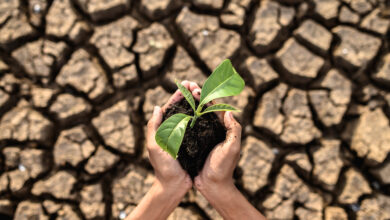Global Climate Accord: Striking a Balance on Fossil Fuel Transition Amidst COP28’s Complex Negotiations

Discover the intricacies and outcomes of the COP28 climate summit agreement, highlighting global efforts to transition away from fossil fuels and mitigate climate change.
During the COP28 climate summit, nearly 200 nations have come to an agreement that marks a significant shift, urging all countries to move away from fossil fuels to mitigate the severe impacts of climate change. Following intense negotiations spanning two weeks in the United Arab Emirates, the deal was swiftly ratified by COP28 president Sultan Al Jaber. His actions garnered applause from delegates and a warm embrace from UN Climate Chief Simon Stiell.
Despite the impassioned pleas from over 130 countries’ scientists and civil society organizations, the agreement fell short of explicitly committing to phasing out or reducing the use of fossil fuels.
A middle ground was reached, urging nations to contribute to the global endeavor of transitioning away from fossil fuels in energy systems in a fair, systematic manner. This approach hastens action during this crucial decade to achieve net-zero emissions by 2050, aligning with scientific findings.
Key highlights from the agreement comprised the following:
- Reinforcement of the 1.5C goal, recognizing the necessity of a 43% reduction in emissions by 2030 and a 60% decrease by 2035 compared to 2019 levels. This implies a substantial escalation in targets and policies when nations present new commitments in 2025.
- Endorsement of a call for a threefold increase in global renewable energy and a doubling of the pace of energy efficiency enhancements by 2030.
- Removal of a statement stipulating that global emissions should peak by 2025. Despite evidence suggesting China and others might reach this peak for their emissions by then, objections led to the omission of this provision.
- Inclusion of language influenced by fossil fuel interests, such as the reference to ‘transitional fuels,’ interpreted as a veiled allusion to natural gas, and the mention of ‘carbon capture and utilization and storage.’
- Limited progress on climate adaptation and finance, both acknowledged in the agreement as requiring trillions of dollars in support.
- Activation of a fund for loss and damage to aid the most vulnerable in addressing the repercussions of climate breakdown — a significant stride forward. However, substantial efforts are still needed to bolster its capacity.
What others are saying
Following the approval of the deal, French Minister for Energy Agnes Pannier-Runacher hailed it as ‘a triumph for multilateralism and climate diplomacy.’ She further emphasized, ‘Now, our focus should shift towards devising a strategy to move away from fossil fuels, and we will be vigilant in this regard.’
Earlier, Norway’s climate and environment minister Espen Barth Eide remarked, ‘This marks the first instance where the world rallies around such a precise statement advocating the necessity of transitioning away from fossil fuels… It has been a longstanding issue that has finally been squarely addressed. This outcome is the result of numerous discussions and intensive diplomacy.’
The document presented during about a fortnight of discussions marked the third iteration. Curiously, the term ‘oil’ does not find mention anywhere within the 21-page document, while the phrase ‘fossil fuels’ is referenced twice.
Conclusion
Criticism has been directed at the conference in the UAE, one of the world’s top 10 oil producers, for its close affiliations with fossil fuel interests, notably following the appointment of oil executive Al-Jaber to oversee the negotiations.
Numerous financial matters are anticipated to be resolved during the forthcoming climate conferences in Azerbaijan and Brazil over the next two years.
The United Nations Environment Programme has estimated that developing nations require between $194 billion to $366 billion annually to aid in adapting to a more heated and unpredictable world.
The Disposal Company is on a mission to transform India’s approach to sustainability, offering an innovative platform that allows brands to go plastic-neutral and carbon-neutral, and make a meaningful impact on the environment. Discover more here.




